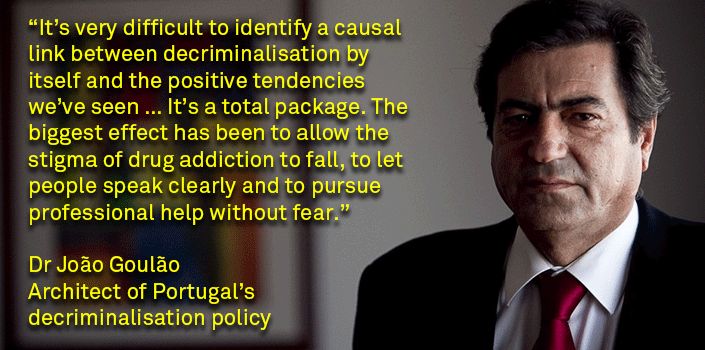
Continuing with my series “Lessons from Abroad” we’re going to explore Portugal.
Portugal’s Drug Policy
In 2001, Portugal got sick of sending people to prison for everything from heroin, to cocaine, to cannabis. So, in effect, that year they decriminalized drugs. All of them. Unless you were caught dealing drugs, you didn’t go to prison. You went to counseling instead; just as you would any other mental illness. They treated addiction like…well…addiction.
Through this program, Portugal dropped its citizen’s death rate by drugs down to five times lower than the rest of the EU. They also saw less people falling off the wagon to return to drugs and a drop in drug-related HIV by 95%. In effect, they turned around their drug problem in the span of only a decade with minimal cost to their taxpayers.
What We Can Learn
Right now, there is a heroin epidemic in the U.S. The Trump-gaffe about heroin in New Hampshire highlights just how much this problem has gone unnoticed and untreated, despite in some states killing more people than car crashes. What’s worse, instead of treating those who are addicted, the U.S. just throws them into the prison-industrial complex; the red-headed stepchild of our government (we speak a lot of its half-sibling, the military-industrial complex, but that’s for another lesson).
We can learn a lot of Portugal and how it handled its drug crisis.
- Stop throwing sick people in prison! It’s stupid, useless, borderline criminal and it doesn’t work. Considering we already have more individuals in the system per capita than the rest of the modern world, this would go a long way to stopping the spread. And when you put people in the system, do you know what you get? Criminals. Criminals, who by the way, struggle because they are labeled criminals, have no job and have no way to get a job. Want to guess what happens to them eventually (according to statistics)? That’s right, they end up back in prison. Thankfully, this is getting lower, but then again, we aren’t worried about “reefer madness” anymore and many others are seeking new ways to combat drug addiction.
- Portugal did this with deregulation, not new laws. That’s right, the success of this wasn’t adding new law, but a radical shift of taking away law. Deregulation, decriminalization; you know, things that Libertarians have been arguing for years. It was effective in lifting a burdensome government in order to allow people to seek the treatment they needed.
- Though Portugal did this with their government, a government solution may not be helpful to America due to its past. Many who read the articles about Portugal say government can accomplish this, but remember that our history with drugs and government is by no means clear, and by no means doesn’t have hurdles to overcome. Looking at this and this from Adam Ruins Everything is a good indicator about why we should look for non-government oriented solutions.
Follow Up
There is no magic wand here, guys and gals. With so many in the prison system now, government will more than likely try to intervene in the current crisis. It will be up to liberty-minded individuals to keep them in check and push for a non-government solution. The message must be clear. “The War on Drugs” people, drug companies that over-prescribe opioids and private-prison companies with government hands in their pockets all stand to gain in keeping the status quo, leaving millions in prison. Already, Libertarians have combated some of the symptoms. Look at the Libertarian Party of New York pushing to restore voting rights to felons. It’s possible to go forward.
This issue is a proverbial minefield of problems keeping people from seeking treatment; with both social, societal and legal pressures keeping it from being tackled. But if the picture of overdosed parents with a four year old doesn’t move you to want to change this, I don’t know what will. Hopefully, however, we do something in time before someone decides they can make money off this crisis, enact a new law or declare a new “War on Drugs” instead of helping the individuals who are affected.
One Comment Add yours